|
“The LORD will fight for you; you have only to keep still.” -Exodus 14:14 There is something so comforting about the feeling of warm water. I revel in it every time I absentmindedly wash another dish or hop into the shower. The latter, especially, has become a type of mini-retreat for me. I turn the water to just under scalding and sneak away after my children’s bedtime for what has become a time of personal prayer. Here, there are no diapers to change, no sibling qualms to suppress, no crumbs to pick up, no stains to spray. There is only me, the water, and God. Sometimes, I choose to put on some favorite songs or hymns. Other times, an insightful podcast will do. But most of the time, I just crave the silence that cascades all around me, washing the ups and the downs, the moments of peace and frustration, away. It’s not haphazardly that the Church uses water in the sacrament of Baptism. And it’s not coincidental how soothing and renewing a warm bath or shower can be. From the beginning of time, God has used water to make things new. In the story of Creation, his spirit hovers above the waters and creates order and beauty out of chaos. In the story of Noah, he cleanses the earth of sin through water and creates the world anew—giving humanity a fresh start. In the story of the Exodus, the Israelites pass through the water of the Red Sea from slavery into freedom. And at the Cross, Christ pours out blood and water from his side to give birth to the Church and open the doors of salvation. It is for these reasons that water is so significant in the sacrament of Baptism. Throughout salvation history, God has used water to create order out of chaos, cleanse us of our sin, lead us from spiritual slavery to freedom, and incorporate us into the Church as his sons and daughters. Baptism does all of these things. It is the first sacrament of initiation and the most life-changing event we will ever encounter—more life-changing even than our birthdays, wedding day, ordination day, or the day we may become parents. The other sacraments, life-changing and beautiful as they are, cannot occur without us first being baptized. As the Catechism explains, “Holy Baptism is the basis of the whole Christian life, the gateway to life in the Spirit (vitae spiritualis ianua),4 and the door which gives access to the other sacraments” (1213). Furthermore, Baptism fundamentally changes our identity. St. Paul explains in Ephesians 4:22-24 that in Baptism we “put away the old self of your former way of life…and put on* the new self, created in God’s way in righteousness and holiness of truth.” A few weeks ago, as we entered into the second week of Ordinary Time, we heard another story with water: the story of the Wedding Feast at Cana. In this case, God takes water, an ordinary, natural element, and changes it into something new. Where there was lack, he created abundance. He continues to do this today -- a thought that gives me hope during trying times. After a week of illness in our immediate family, the loss of an extended family member, elevated sibling rivalry, communication breakdowns, a close friend in the hospital, general isolation, and a stolen credit card (for good measure), I find myself in the bathtub once more—slowly breathing, closing my eyes, and praying: make me new. With ragged emotions, a fried brain, and a heavy heart, I whisper, “Lord, I have nothing to give.” Like the jars of wine at Cana, I am empty. How fortunate for us that this is the area of God’s specialty: our weakness. Only weeks ago at Christmas we marveled at this in a special way as God physically entered into our frailty in the frailest of forms—as an infant. Now we hear about this God-man beginning his ministry by providing an extravagant amount of wine at a wedding. God doesn’t skimp. And as I breathe in and out slowly in the water, I remember the truth of who God is and what he has done. He can take my chaos and make order and beauty. He can take my slavery to sin and my ego and free me to love. He has incorporated me into his family. And every time I choose to participate in the sacraments and live out my baptismal identity, he makes me new by filling me with his grace. If you, too, are feeling tired, sick, overwhelmed, or stressed, I invite you to remember in prayer, “The LORD will fight for you; you have only to keep still.”
0 Comments
Birthdays and anniversaries are often occasions of great joy! Many of us count down to and look forward to these meaningful celebrations of life. We invite friends and family members to share in our joy. What if we celebrated our Baptism, the day of our “rebirth,” in the same way? Pope Francis has repeatedly issued a challenge to do just that: “…[I]f we celebrate birthdays, why not celebrate — or at least remember — the day of rebirth?” (General Audience, April 11, 2018). More than a simple invitation to learn the date of our Baptism, Pope Francis urges us to allow this observance to “reawaken the memory of Baptism.” He tells us that, “To know the date of our Baptism is to know a blessed day. The danger of not knowing is that we can lose awareness of what the Lord has done in us, the memory of the gift we have received. Thus, we end up considering it only as an event that took place in the past – and not by our own will but by that of our parents – and that it has no impact on the present… As I know my birthday, I should know my Baptism day, because it is a feast day.” (General Audience, January 8, 2014) My mother has always made a point of reminding my siblings and me of our sacramental anniversaries. Whether it’s making a special dessert or just telling us stories of the festivities and recounting small details from the ceremony, she makes it feel like a feast day. Now, with my own children, I am trying to imitate her example and make a more concerted effort to mark these events in our family’s life and draw out their significance. Today marks the fourth anniversary of my son’s Baptism. As we celebrate the occasion, I am hoping to put into practice at least a few of the following ideas:
I hope that my son looks forward to his baptismal anniversary every year with as much excitement as he does his birthday. Even more than that, I pray that he may grow to recognize his Baptism as a formative part of his identity. I encourage you to learn the story of your Baptism if you don’t already know it. Find out the date on which you were baptized, where you were baptized, and who your godparents are. Mark this day on your calendar and decide how you can commemorate this day each year. It may be as simple as going to Mass, spending extra time in prayer, or gathering with friends for a special meal! No matter what you do, resolve to make it a day of gratitude and celebration for the great gift of God’s grace in your life. Whether we are marking the occasion of our own Baptism or that of a friend or family member, “Let us, then, ask the Lord from our hearts that we may be able to experience ever more, in everyday life, this grace that we have received at Baptism. That in encountering us, our brothers and sisters may encounter true children of God, true brothers and sisters of Jesus Christ, true members of the Church” (Pope Francis, General Audience, January 8, 2014).
“He placed himself, in the words of Saint John Chrysostom, “at the service of the entire plan of salvation”. With praise as high as this, Pope Francis described Saint Joseph and his unique place between the Mother of God and the Son.
If Saint Joseph occupies a pivotal role in the divine plan, then his role in my family is just as special. Both of my godsons have the middle name of Joseph - as do I, and my father, his brother, and their father before them. In our family, Joseph is first and foremost a protector. In the Apostolic Letter declaring the Year of Saint Joseph, the Holy Father describes St. Joseph in this way: “Joseph was the earthly shadow of the heavenly Father: he watched over him and protected him, never leaving him to go his own way.” A fundamental element of being a godfather, born from the promises made at Baptism, is the obligation to watch over my godchildren. The daily exercise of this responsibility occurs through prayer. Since the start of the pandemic eighteen months ago, it’s been next to impossible to see my godchildren in person or to be a physical presence in their lives. Consequently, my responsibility to keep them in daily prayer has become doubly important. Morning prayer for my three godchildren is a cornerstone of my daily routine. That prayer has been a constant for me, even when other elements of my routine undergo the dry spells that are part and parcel of the spiritual life. This steadfast but gentle responsibility - prayer for my godchildren - has been a source of sanctification for me. In this, I am privileged to follow in the footsteps of Saint Joseph, who had the unique grace to help raise the Son of God and to be shaped and formed by this responsibility. Beyond protection, Saint Joseph is a model for godfathers by dint of his vigilance. While not strictly a virtue, this watchfulness is closely related to the virtues of prudence, fortitude, and temperance. The Gospel of Luke puts it thus: “Be dressed for action and have your lamps lit” (Lk 12:35). Matthew relates the command of God in even more explicit terms: “Get up, take the child and his mother” (Mt 2:13). While taking nothing away from the Blessed Mother’s incomparable “Fiat”, Joseph exemplifies the ability of responsiveness to God’s call in the face of uncertainty. For me as a godfather, this means living in such a way that I can be responsive to my own godchildren. That might mean being prepared to travel long distances in order to make a sacramental celebration or a birthday. As my godchildren mature and explore their faith, it may also mean being an additional source of counsel (or a source of comfort to stressed-out parents!). Whatever the call may be, the response is the same: be prepared to answer without hesitation, as Saint Joseph did. I would be remiss by not mentioning that Joseph’s care for the Blessed Mother is an example of paramount importance for any godfather seeking to advance his own spiritual life and that of his godchildren! One final element of contemplation for me as a godfather is the title of Saint Joseph the Worker, particularly as it relates to the life of Christ. Through his steady and diligent work, Saint Joseph was a model and example for Our Lord, who himself spent the first thirty years of his life laboring as a carpenter and preparing for his ministry. In the words of Pope Leo XIII, writing in the encyclical Rerum Novarum: “This is enforced by what we see in Christ Himself, who, ‘whereas He was rich, for our sakes became poor’; (18) and who, being the Son of God, and God Himself, chose to seem and to be considered the son of a carpenter - nay, did not disdain to spend a great part of His life as a carpenter Himself. ‘Is not this the carpenter, the son of Mary?’(19)” To this, let me add the words of the Holy Father in his apostolic letter, Patris Corde: “Joseph is certainly not passively resigned, but courageously and firmly proactive. In our own lives, acceptance and welcome can be an expression of the Holy Spirit’s gift of fortitude.” Saint Joseph is an exemplar not only of the ability to respond immediately to God’s call when it comes, but also of the fortitude and diligence to work patiently and well until that call comes. Through his example, we godfathers are reminded to “trust in the slow work of God”, confident that in prayer, labor, and - above all - openness to God’s voice, we can strive to be as Saint Joseph was: “at the service of the entire plan of salvation.” “In the name of the Father, the Son and the Holy Spirit.” This is how I begin all of my prayers; and it comes from a long tradition in Christianity. As Catholics, we usually accompany these words by making the Sign of the Cross with our hand. Why is this so important to our faith and to me personally? To begin, I suggest revisiting and praying the Nicene Creed as it is proclaimed at every Catholic Mass. This is our profession of faith. The Holy Trinity – three persons in one – is a mystery we mere mortals can scarcely understand, but it explains our identity as children of God. We are taught from the Old Testament that God the Father is the Creator, and He sustains all of the world. In the New Testament we are instructed that God the Son is our Savior, Jesus Christ – both divine and human in nature and whose behavior we strive to model. At Pentecost, as told in the Acts of the Apostles in the New Testament, we are shown that the Holy Spirit is imparted to each of us as the presence of God in us who gives us wisdom and boldness to act as we are taught by Jesus. The unity of these three divine beings in one God is a profound gift I believe in complete faith, and it helps me understand who I am in His Kingdom. I am a child of the Father who loved me into being together with my earthly mom and dad, I am redeemed by the body and blood poured out by Jesus His Son for all my failings, and I am aided constantly by the Holy Spirit to live and profess the Christian life in joy and exuberance! I like to think of myself as being a flesh and bone human with supernatural assistance (as long as I cooperate with the will of God)! That is a pretty amazing disposition to live out of. We read in the Old Testament’s books of the prophets that God promised a Messiah to save His people, and then in Matthew 1:2-16 the genealogy of Jesus is recorded and spiritually comes to include each of us, who through our baptism become sons and daughters of God. This is an earthly and divine bond like no other in all of creation. There is so much more to us human beings than our earthly bodies and this temporary space we inhabit. We are walking, talking, living, breathing messengers of God the Almighty, commissioned to share love and mercy to every other living being around us. We are flesh and bone, but we are also spirit and intellect. When in right relationship with our Lord, we are the dwelling place for God to move and work in and through us. Understanding our identity and praying for guidance to live it out in what we do and say is imperative to being a member of the Kingdom of Heaven. This knowledge and the grace and virtues that flow from accepting our mission gives us the power to bring life and healing and hope and joy to a hurting, confused, and broken world. So, if you are ready to accept the mission, be prepared to be filled to overflowing with the Holy Spirit and be equipped with all that is necessary to be a present day apostle! Several years ago, one of our young sons made a simple but beautiful bookmark for my husband as a gift. It was brightly colored and had the words: WORK FOR GOD! down the middle. This summarizes exactly what we are called to do and continues to be a great reminder as it sits in my husband’s Bible. The Holy Trinity is the foundation of all our Christian beliefs and it gives me great comfort knowing who I come from and who I belong to for time and eternity, even when I do not fully comprehend it. We can sing from the rooftops: “Holy Father, Holy Son, Holy Spirit, three we name Thee; while in essence only one, undivided God we claim Thee; and adoring bend the knee, while we own the mystery” (Holy God, We Praise Thy Name by Ignace Franz). To learn more about living as a missionary disciple, please click here. Tomorrow, we celebrate the birthday of St. Vincent Pallotti, patron of the Catholic Apostolate Center and founder of the Union of Catholic Apostolate. St. Vincent Pallotti was born on April 21, 1795. How appropriate for the saint who lived and worked in the city of Rome to share his birthday with the traditional date for the founding of the city. To help celebrate his birthday, I have put together a list of some of his more interesting achievements and activities during his life. I hope that you too will be inspired by his life. 1) The Baptism of St. Vincent Pallotti St. Vincent Pallotti was baptized on April 22, 1795 in the St. Lawrence Church in Rome. This began his life in the church. 2) St. Vincent Pallotti on Holiday On his arrival in Frascati around 1805, St. Vincent Pallotti exchanged his new shoes for that of a poor boy. Giving away his new clothing to the poor would become a lifelong habit for the saint. 3) St. Vincent Pallotti Makes a Prediction While speaking with the young Giovanni Mastai-Ferretti in 1817, St. Vincent Pallotti predicted that he would one day be elected to the papacy. Mastai-Ferretti was elected Bishop of Rome on June 16, 1846. 4) St. Vincent Pallotti the Professor St. Vincent Pallotti was awarded two doctoral degrees in both theology and philosophy in 1814 and 1819. Teaching was one of the favorite activities of the saint. 5) St. Vincent Pallotti Showing Courage During the cholera epidemic of 1837, St. Vincent Pallotti organized a barefoot procession of religious. This action was penitential and showed that they were not afraid of the disease. 6) Catholic Apostolate Received Church Approval St. Vincent Pallotti received approval for the Catholic Apostolate from the Church in 1835. Pallotti also received support for the Catholic Apostolate from Pope Gregory XVI when others objected to it. 7) St. Vincent Pallotti the Chaplain Beginning in 1838, St. Vincent Pallotti served as a prison chaplain in Rome. He often worked with the condemned, saving many souls. He had a true willingness to serve all, especially the poor and the marginalized. 8) St. Vincent Pallotti the Peacekeeper St. Vincent Pallotti stopped a riot in the Trastevere neighborhood of Rome. He implored the people to stop rioting by showing them an image of Mary, Mother of Divine Love. 9) St. Vincent Pallotti Preaches one Last Time On the last day of the octave of the Epiphany in 1850, St. Vincent Pallotti gave his final sermon. 10) St. Vincent Pallotti Dies In 1850, St. Vincent Pallotti gave his final blessing to his followers. He showed great courage even in the face of death. There are many more stories about St. Vincent Pallotti that you may find interesting. Check out our St. Vincent Pallotti Portal to learn more about our patron and his many works. Baptism is one of my favorite subjects to teach my Pre-K students. Often, it is the first time the boys and girls really get a chance to learn about what Baptism is. Other times, it provides them a chance to share about their own sacramental experience or that of someone they know. Throughout the unit, everyone is given a chance to celebrate being part of God’s family in the Church. Learning about Baptism is a PreK standard in their catechesis, and we begin January by learning about Christ’s Baptism in the River Jordan. We learn that it was John the Baptist who prepared the way for Jesus and offered a baptism of repentance. John came before Jesus telling the people to, “’Prepare the way for the Lord!’ preaching a baptism of forgiveness of sins” (Mk 1:3-4).
Like the people whom John baptized and preached to, we likely are feeling in need of renewal. As we welcome this new year, we can also be renewed and cleansed from such a challenging year spiritually, emotionally, and physically! We can start fresh this year, and hear John, “a voice crying out in the desert.” For me, 2020 often felt like a desert. At times, I felt as though my thirst for the Eucharist was unbearable since going to Church was unsafe. Other times, it seemed like I was stranded alone with a new baby and deserted by any additional help. This year has taken its toll on so many, in so many ways, and everyone’s desert has been hard. This pandemic has left many of us yearning, thirsting, and begging the Lord for renewal. Let us consider putting on a new self in renewing our own baptismal promises, participating in the Sacrament of Reconciliation, and entering 2021 with clean and refreshed hearts! My son was welcomed into the Church through Baptism in September. We followed the safety restrictions, had an option for virtual participation, and were able to celebrate our little child of God being cleansed of original sin. It was a humbling and beautiful Mass and Baptism. While I was holding my son, Vincent (named after St. Vincent Pallotti), I could feel God's presence and see it unfolding before my eyes. For a moment, my desert had become an oasis. Life, water, joy, gratitude, my little boy’s squeals, and love were present there with us. I knew there and then that my son had been renewed and would in turn bring some renewal into our lives. Just as my son’s baptism brought refreshing hope into my family’s life, the Lord’s Baptism can bring renewal and hope into our lives as Catholics. At the Lord’s Baptism, he received his mission. May we continue to reflect upon our own mission as disciples in this upcoming year. Our hearts are yearning to be cleansed and renewed amidst our many deserts. Like my students learning about Baptism for the first time, let us engage our hearts and open our ears to the Word anew. Like my son’s Baptism showed me an oasis amidst a desert storm, let us find joy in our own Baptisms this year. Here is a prayer to leave you with as we begin the year anew: Heavenly Father, as a new calendar year begins, cleanse us with new hope and give us nourishment in your Son, Jesus Christ. Wash away our sadness, pain, and fears and help us to know your love throughout this upcoming year. Help us prepare the way for you to come into our hearts, oh Lord. Turn our own desert into oasis. In Jesus' name we pray, Amen.
For the past 145 years on the Feast of Our Lady of Mt. Carmel (16th of July) in my hometown of Hammonton, New Jersey, there is a procession through the streets of the statues of various saints that usually reside inside the local parish church. The faithful who are devoted to each saint distribute prayer cards of their patron as they process with the statues through the streets – St. Joseph, St. Anne, St. Anthony, St. Rita, St. Jude, St. Rocco, St. Lucy, St. Vincent Pallotti, and so forth. The Blessed Mother, while at the end under the title of Our Lady of Mt. Carmel, appears also in the procession under various names – Milagrosa, Nuestra Señora de Guadalupe, Our Lady of the Assumption, and the Immaculate Conception, whose Solemnity we celebrate today.
Sometimes, these various titles and ways of representing the Blessed Mother can be confusing for some of those who line the streets of the procession route. My mother, Angela, who has been part of the procession for over 50 years, makes a float with a large Rosary and a statue of the Blessed Mother under the title of the Immaculate Conception on it, although some would call the statue “Our Lady of Grace.” The statue, which is over 100 years old, is patterned after the image on the “Miraculous Medal,” around which is inscribed the words, “O Mary, conceived without sin, pray for us who have recourse to thee.” Since many who come to the procession are not necessarily practicing Catholics, my mother always offers a form of “street evangelization” to those who come to her float to receive a prayer folder that provides instructions on how to say the Rosary. Since the statue of the Immaculate Conception is on a special float, many will come and ask if it is of Our Lady of Mt. Carmel. Sometimes, my mother is asked what the difference is between the Immaculate Conception and Our Lady of Mt. Carmel. She responds cheerfully, “Same Lady, different dress.” My mother then goes on to explain why the Blessed Mother has so many titles. She also assists these curious onlookers in understanding how Mary offers us the greatest example of how to follow Jesus as his disciple. She helps them learn that Mary was prepared from the time of her conception in the womb of her mother, St. Anne, to receive Jesus and did so throughout her life. We, too, are meant to be prepared to receive Jesus into our lives in an ongoing way, especially during the Advent season. We have not been conceived without sin, but we have been washed clean of Original Sin at Baptism (and all prior sin, if one was baptized as an adult). While we have all sinned since that time, our Baptism offers us a share in the mission of Jesus Christ as Priest, Prophet, and King. Though followers or disciples, he also sends us as apostles, or as missionary disciples, out into our challenging world to witness to him by what we say and do. The Blessed Virgin Mary offers us the best example of how to follow Jesus Christ. No matter what title of hers might appeal to us spiritually, she is always “same Lady, different dress.” She was the same in her following of Jesus during her life and continues from her heavenly home to invite us to follow her Son, Jesus Christ, Our Savior and Lord. O Mary, conceived without sin, pray for us who have recourse to thee! The Catholic Apostolate Center is a ministry of the Immaculate Conception Province of the Society of the Catholic Apostolate (Pallottine Fathers and Brothers). The Pallottines and the Center staff will remember you in special prayer on this Solemnity of the Immaculate Conception.
The month of September is ripe with themes of renewal. Schools begin a new academic year. Some businesses start a new fiscal year. The season of autumn is bright with arboreal colors as some trees begin to turn dormant. Fields and gardens are harvested.
Those of us with yards know now is also the time to prepare and reseed our lawns for new grass to grow. For many, it’s a labor of love to cultivate the land. First the land needs clearing. Rocky soil demands aeration. Soil testing will help with fertilizing. And getting the right seed is critical! Furthermore, once planted, the new seed must be constantly watered, watched, and protected from harsh elements and nefarious agents. Is there a lesson from all this? Yes, great results require great effort, but we are also reminded of the parables of the sower and the weeds (Matthew 13:1-30). What I always liked about these parables was that our Lord Himself explains them so clearly: the Word of God is given to each of us; how it takes root is up to us. The seeds in the parable represent the deposit of faith we have each been entrusted to grow, nourish, and protect as baptized Christians. For those of us with children, we are especially aware of the great gift and responsibility of entrusting the Faith to our descendants. So precious and critical is this sharing that the Church urges parents to have their children baptized without delay. During the Rite of Baptism for an infant, the priest or deacon says to the parents: You have asked to have your child baptized. In doing so you are accepting the responsibility of training him (her) in the practice of the faith. It will be your duty to bring him (her) up to keep God's commandments as Christ taught us, by loving God and our neighbor. Do you clearly understand what you are undertaking? As is the case with any landscaping, the work of spiritual cultivation cannot be underestimated or haphazard. Raising a child in the Faith begins and is centered on the life at home. The environment of faith is so much more than memorizing Scripture or parts of the Catechism; the Faith must be lived! A family that prays together, goes to Mass regularly, is firm in morality and pursuing virtue, and encourages service and charity takes seriously the charge given at Baptism. The deposit of faith is planted at the immersion and anointing of the child during the rites of the sacrament; the family then works and tends to and cares for the germination and growth of this divine inspiration. As good seed sprouts among weeds, so too will the child: he or she will encounter the ways of the world that are ignorant of God; he or she will be tempted by sin; he or she may wander as a lost sheep, though the identity claimed at Baptism never disappears. As baptized believers, do we understand and appreciate what has been given to us? Do we help cultivate our spiritual lives in a way that fosters growth and true life? Pope Francis has urged us to remember and celebrate our baptism date: To forget our baptism means to expose ourselves to the risk of losing our memory of what the Lord has done in us. We risk ending up considering it only as something that happened in the past, and not the Sacrament in which we became new creatures and were clothed with Christ, made part of the relationship of Jesus with God the Father. Thanks to Baptism, we are also able to forgive and love those who offend us and do us harm; we are able to recognize in the last and in the poor the face of the Lord who visits us and is close to us. In short, more than a sociological moment that inscribes our name in the parish register, the day of our baptism constitutes a commitment and the identity card of the believer. The Sacrament of Baptism continues to sustain us through life: we are children of the Most High God! We may go through periods of spiritual drought or darkness, but we can find refreshment and renewal by attending Holy Mass, washing away sin through repentant confessions, and sustaining lives of prayer, faith, hope, and love. Then, having known the fruits of labor initiated by our parents, we can indeed be drawn up as part of the Lord’s bountiful harvest as He Himself has planted: “It [is] very good.” As the ongoing coronavirus pandemic eventually allowed for opportunities to leave the home, one of the most meaningful greetings which welcomed my return to Mass were the familiar words, “Peace be with you.” The calming presence of the parish priest eased the troubles of my mind, soothed the restlessness of my heart, and enlivened my soul to sing, “Let us go unto the House of the Lord!” While the celebration of the Holy Sacrifice of the Mass and the reception of our Lord in Holy Communion immediately made up for the lost time during the pandemic, there were other reminders that we had been away: new priest assignments, reminders to exchange the weekly offering envelopes, many parishioners enthusiastically greeting each other in happy parking lot reunions, our pastor sporting a new beard, and someone even observing, “You’ve lost some weight, Father!”
The place our parish priests hold in our hearts is a treasured one. We depend on them to teach us through homilies, expose the Blessed Sacrament, listen to our sins and offer absolution, preside over the nuptial Mass, baptize our children, anoint the sick, and console us through times of death. And that’s just the minimum. While the rest of us are busy at work, school, or caring for our households, our parish priests are meeting with the church leadership, making rounds at schools or hospitals, organizing retreats and special services, offering spiritual guidance, and working at the rectory. But caring for the spiritual needs of hundreds of parishioners does not end at 5 PM. Starting from the sacred occasion of ordination, a priest is always on-call. Who rushes to the side of the dying, cares for those who have lost everything, counsels those in conflict, or ministers through any number of crises? Who faces the mounting expenses and bills of the parish, limited Sunday collections, possible stagnation of new family registrations, and who perhaps lacks as many helpful hands as he would like to keep the place running smoothly? Especially through this pandemic, the parish priest again and again is called to bring us into an encounter with Jesus Christ as best he can with whatever resources are at his disposal. If caring for our household’s needs presents a challenge, just imagine how the parish priest feels overseeing his parish! As the Church celebrates the feast day of St. John Vianney, we can see how so many of the priests in our lives emulate the example of the Curé d'Ars, who himself followed the example of the priesthood of Jesus Christ. The French Revolution resulted in an increase of the population’s ignorance of and indifference to religion. As a result, St. John Vianney went about his priesthood by spending at least 11 or 12 hours a day in the confessional in the winter; longer still in the summer. The simple piety of this holy priest not only brought about many conversions for the Church, but reinvigorated the faith in areas where secularism had long dominated the culture. Likewise, by immersing themselves into the daily lives of our communities, our parish priests “serve ‘in the trenches,’ bearing the burden of the day and the heat (cf. Mt 20:12), confronting an endless variety of situations in [their efforts] to care for and accompany God’s people.” Pope Francis continued, in his 2019 letter to priests commemorating the 160th anniversary of the death of St. John Vianney, to express his closeness and solidarity to priests. He also expressed personal gratitude “for your fidelity to the commitments you have made… [and] for the joy with which you have offered your lives.” The Holy Father concluded his letter by praising the witness of their shared vocation: For I am confident that “God takes away even the hardest stones against which our hopes and expectations crash: death, sin, fear, worldliness. Human history does not end before a tombstone, because today it encounters the “living stone” (cf. 1 Pet 2:4), the risen Jesus. We, as Church, are built on him, and, even when we grow disheartened and tempted to judge everything in the light of our failures, he comes to make all things new.” … May we be men whose lives bear witness to the compassion and mercy that Jesus alone can bestow on us. Let us strive to show the priests in our lives our gratitude and support. May many men continue to discern and answer the call of our Lord to the sacred work of ordained ministry. As we answer the universal call to holiness in our own lives, may we also support those who have dedicated their lives to answer, “Here I am. I come to do Your will.” To learn more about Holy Orders, listen to our latest podcast here. 6/30/2020 Living the Mission of Jesus: Overcoming Racism by Entering In, Listening, and AccompanyingRead NowThe din of breakfast time in a house full of little ones required that I practically yell to my husband to be heard over requests for more milk: “I just feel so sad for our country. I feel sad that so many people are suffering. I’m sad about how devastated God must feel.” Before he could respond, my sweet, sensitive 5-year-old hugged my legs. “It’s okay to feel sad, Mom. But, why are you sad for our country?” And so our dialogue began. I gently told him about the injustices being faced by our Black brothers and sisters. I reminded him that God made each of us in His image, and that we are each deeply loved by Jesus. I reminded him that racism is a sin, and that Jesus conquered our sins by His death on the Cross. We love Jesus and honor His sacrifice by turning away from sin. And then I told him that we have work to do: as Catholics, we get to be like Jesus by fighting against racism. As believers, we are called to make the world more loving and just. So together, we enter this mission of Christ. Our baptism calls us and sends us out, equipping us to live as members of the Body of Christ. The Catechism calls us “members of each other, (CCC no. 1267)” and as such, we have a responsibility to live that way. Using the life and love of Jesus as the guiding principal of our faith, we are invited to acknowledge the suffering of those around us. Saint Paul writes in his letter to the Corinthians, “If one part suffers, every part suffers with it; if one part is honored, every part rejoices with it. Now this is the body of Christ” (1 Corinthians 12:26). This is unity as the Body of Christ: a people not positioned as ‘left’ or ‘right,’ for only the unborn or for only Black lives, but positioned at the foot of the Cross. Our Church, informed by the Gospels, calls us together to this work to uphold the dignity of the person, letting Jesus show us the way. Jesus was moved with compassion. At the death of Lazarus, he wept. At the woman’s desperation for healing, he allowed himself to be touched by her. He entered into the woman at the well’s loneliness and shame and met her with mercy. Jesus showed up heart first, revealing how we might accompany each other. As a white woman, I cannot know the suffering of the Black community. I can, however, emulate Jesus by allowing myself to hear and see hurt and be moved deeply by it. Instead of rationalizing, self-aggrandizing, or refusing to acknowledge the pain of another’s story, I open my eyes to see the brokenhearted—even when it challenges me, even when it hurts. Like Jesus, I weep for the loss of Breonna Taylor, George Floyd, Ahmaud Arbery, Rayshard Brooks, and so many others. I allow myself to feel and enter into the pain. I lean in until it makes me want to do something. Jesus stood with the vulnerable. God made flesh dwelled among us and was moved with compassion for his people. Seeing the suffering of Martha and Mary, he raised Lazarus from the dead. At the ailing and fear of the bleeding woman, he extended healing and peace. He saw the shame of the woman at the well and revealed himself as God to her, declaring her worthy of His life-giving water. In these examples and countless others, Jesus reveals himself as unapologetically for and with the least of these. As Catholics, we are called to this mission. In response to the just anger of our Black brothers and sisters, we stand in solidarity with all who experience the sin and effects of racism . Moved by this pain, we cry out to our Father for healing and peace. Using our voices, votes, and dollars, we stand for and with the Black communities and all affected by the sin of racism, declaring the value of each life and the dignity of each person. I am tempted to avoid this work. Showing up heart first the way Jesus did requires a vulnerability and humility I often lack. I become disproportionately concerned about being comfortable and being right. I am tempted to keep my head down, refusing to be moved and challenged by new voices and stories. Yet, I am called to look up. When I pridefully insulate myself from the pain of a hurting person or community by my refusal to enter in, openhearted, I deny the dignity of their personhood by not validating their experience. By guarding my hardened heart, I fail my baptismal calling. Jesus concerned himself more with loving the low in spirit than the repercussions of caring. He entered in, listened, and loved each person—especially the marginalized. So today I seek to live like Jesus. I choose to sit in sorrow for the pain of my Black brothers and sisters. I lift up my voice in prayer, confident that God sees and cares deeply about justice, unity, and life. I choose to look to the mission of Jesus to remember my own. Join me.
If you’re used to communicating with others via text message, then you’ve probably, at some point, received a message and interpreted it out of context. A curt reply with a period at the end could be misinterpreted as either passive aggressive or as an irritated response. This happens to me occasionally, and I always have to remember that without hearing a person’s message verbally, it can be difficult to understand what they’re really saying or implying. Maya Angelou’s quote rings true here: “Words mean more than what is set down on paper. It takes the human voice to infuse them with deeper meaning.” Our voices add a unique depth and fullness to our communications by revealing emotions, nuances, and subtle meanings more sharply than words alone can communicate. On this feast of the Nativity of St. John the Baptist, I am struck by St. Augustine’s words from this morning's Office of Readings: “Today we remember that Zechariah’s ‘tongue is loosed because a voice is born.’” St. John the Baptist was born to be the final prophetic voice who proclaimed the Word made flesh. Like the Old Testament prophets, John foretells the coming of the Messiah and calls sinners to repentance with words that cut to the heart (Luke 3:1-29). But, unlike the Old Testament prophets, John identifies the Messiah for the first time in salvation history. John points Jesus out and encourages his followers to pursue him (John 1:29-37). He is confident that his cousin is the foretold Christ, and by his proclamation John fulfills the mission of all the prophets as he straddles the boundary of the Old and New Testament. John’s historical mission of giving voice to the Word is also our mission. At our baptism, we were anointed as a priest, prophet, and king. We share uniquely in Jesus’s ministry, and we are called to be lay prophets who proclaim the good news of repentance and redemption. We must, like John the Baptist, spend time coming to know the promises of the Messiah so that we can recognize Him when we see him. And when we see Him present in the sacraments, or when we encounter Him as we are accompanied by a spiritual mentor, or when we experience Him through the fullness of our prayer, we must point Him out for all to see. To fulfill our baptismal call to be prophets of the Gospel of Christ, we must give voice to our experiences of God. John’s words must be our words to the world, “Behold, the Lamb of God.” 4/7/2020 Spiritual Friendship: Accompanying College Students During COVID-19 | COVID-19 ResourceRead NowA few of my staff colleagues and all of our interns at the Catholic Apostolate Center are undergraduate students at The Catholic University of America. We, like university students across the country, find ourselves doing remote coursework, dealing with unresolved goodbyes that were meant for a week of break and not months of uncertainty, and the seniors are facing the reality of a delayed, if not completely cancelled commencement. Jonathan Sitko, Assistant Director of Programs for the Catholic Apostolate Center, recently wrote a blog post titled “Accompaniment in Isolation” in which he said, “Each one of us is called to accompany others on the journey of faith. Christ himself modeled this with his disciples and has charged us to do the same. Accompaniment is fundamental to Christianity.” In this time of great uncertainty, I think of my friends, university community members, and all of the college students across the country who are in need of exactly this—of accompaniment. The Art of Accompaniment: Theological, Spiritual, and Practical Elements of Building a More Relational Church reminds us that, “Accompaniment is not for a few ordained or specially commissioned lay ministers; it is a call put forth to all the baptized by the Spirit of God.” I hope that our campus ministry programs are finding ways to accompany students in these times through personal communication when feasible, opportunities for virtual community, and streamed prayer opportunities. These are important and stress the nature of community within our campuses and the desire for students to regain a sense of normalcy in a situation that is so abnormal. The efforts of our campus ministries cannot lead us, the baptized- students, friends, and community- to sit passively. The call that we as students receive in this time of crisis is a call to accompaniment, empowered by the Holy Spirit in Baptism, strengthened at Confirmation. We turn our attention to the dimension of spiritual friendship that the Art of Accompaniment reminds us is, “Like two friends who travel together, this spiritual journey is not undertaken through the sharing of experiences, a character of warmth and tenderness, and involves catching sight of the action of God in the lives of one another.” We are all, in some way, grieving the loss of the life that we once held to be normal; we are all experiencing change, uncertainty, and unrest; and we are called to accompany one another through that. This distinct dimension of accompaniment reminds us that accompaniment is not a hierarchy, that there are not ranks or levels, but that we can accompany in mutuality and reciprocity, as friends, as Jesus calls us to be. St. Vincent Pallotti believed that in our spiritual weakness, God communicates his infinite mercy to us. But in times of great unease, it can be hard to hear him. Accompaniment allows us to dialogue together so to best hear his voice, to pray together for the greatest needs and hopes that we hold, and to witness hope to one another—hope that springs eternal from Christ himself who is alive, who loves us, and who saves us. Here are some suggestions for how college students can accompany one another during COVID-19:
For other reflections to accompany you during this time, please click here.
“Seek God and you will find God. Seek God in all things and you will find God in all things. Seek God always and you will find God always.” – St. Vincent Pallotti
Do we live our lives seeking God or realize that God is seeking us? God is indeed seeking us. In fact, we have been found in our Baptism. We enter into the mission of the Son who was sent by the Eternal Father into the world to save us. We are co-responsible for this mission and are in “holy cooperation” with the Most Blessed Trinity. Therefore, we are sent by Christ as his apostles or missionary disciples into the Church and the world to revive faith and rekindle charity. We accompany other seekers in becoming found in Christ and through his Church. Today is the 170th anniversary of the death of St. Vincent Pallotti. It is also his feast day. He believed, taught, and lived the ideals of accompaniment, co-responsibility, and holy cooperation mentioned above. His foundation, the “Union of Catholic Apostolate, a gift of the Holy Spirit, is a communion of the faithful who, united with God and with one another in accordance with the charism of St. Vincent Pallotti, promote the co-responsibility of all the baptized to revive faith and rekindle charity in the Church and in the world, and to bring all to unity in Christ” (General Statutes, 1). This means that lay people, those in consecrated life, and clergy are in collaboration with one another, not only in the Union, but also in the Church and with those of good will in the world. Each person has a role. Each person is responsible. Each person shares in the mission of the Church in spreading the Gospel. Pope Francis recently wrote about this shared mission in his Apostolic Exhortation, Christus Vivit. He was writing about ministry with young people, but these words can be extended to all the baptized. “Youth ministry has to be synodal; it should involve a ‘journeying together’ that values ‘the charisms that the Spirit bestows in accordance with the vocation and role of each of the Church’s members, through a process of co-responsibility... Motivated by this spirit, we can move towards a participatory and co-responsible Church, one capable of appreciating its own rich variety, gratefully accepting the contributions of the lay faithful, including young people and women, consecrated persons, as well as groups, associations and movements. No one should be excluded or exclude themselves’” (Christus Vivit, 206). For co-responsibility to be truly a lived reality there is much more work to be done. St. Vincent Pallotti was visionary and prophetic in his understanding, but the work was unfinished. Let us not wait. Instead, let us "remember that the Christian life is one of action; not of speech and daydreams. Let there be few words and many deeds and let them be done well." Blessed feast day of St. Vincent Pallotti! May the Charity of Christ urge us on! We have entered the season of Advent and a new liturgical year. Advent offers us an important time for us to watch, wait, and reflect on the coming of Jesus Christ, on our encounter with him. He is encountered in the mystery of the Incarnation, which we represent by Nativity scenes placed in our churches, chapels, and homes. We can stop at the beauty of the artistic scene and not move ourselves into deeper reflection on the fact that God, who is infinite love and mercy, sent his only begotten Son to save us.
Christ is also encountered in the Eucharist, most significantly during the celebration of the Mass. Pope Francis describes this coming of Jesus: “Mass is prayer; rather, it is prayer par excellence, the loftiest, the most sublime, and at the same time the most ‘concrete’. In fact, it is the loving encounter with God through his Word and the Body and Blood of Jesus. It is an encounter with the Lord.” (General Audience, November 15, 2017). And Christ will come again in all his glory at the end of time. We need to be prepared for this time not simply through passive waiting, but by active watching for the Lord and encountering him in our brothers and sisters who are most in need, especially the poor, the vulnerable, and the voiceless (Mt. 25:31-46). As baptized members of the Body of Christ, we are co-responsible for the mission that he left us until he comes again – for the salvation of souls – not only focusing on eternal life with God, but also on how we are collaborating with the Most Holy Trinity to build the Kingdom of God on this side of life. Pope Francis reminds us of the connection of the Immaculate Conception to the salvific plan of God. “In the Immaculate Conception of Mary we are invited to recognize the dawn of the new world, transformed by the salvific work of the Father and of the Son and of the Holy Spirit. The dawn of the new creation brought about by divine mercy. For this reason, the Virgin Mary, never infected by sin and always full of God, is the mother of a new humanity. She is the mother of the recreated world.” (Homily for the Solemnity of the Immaculate Conception, 2015) We have not been conceived without sin, but we have been washed clean of Original Sin at Baptism (and all prior sin, if one was baptized as an adult). While we have all sinned since that time, our Baptism offers us a share in the mission of Jesus Christ as Priest, Prophet, and King. Though followers or disciples, he also sends us as apostles, or as missionary disciples, out into our challenging world to witness to him by what we say and do. That is why we are told at the end of each Mass to “Go”. We are sent on mission by Christ and the Church as joyful witnesses of God’s love and mercy. Our best example of how to be a missionary disciple of Jesus Christ is the Blessed Virgin Mary. She followed Jesus as his disciple unfailingly during her life and continues from her heavenly home as Queen of Apostles to invite us to encounter her Son, Jesus Christ, Our Savior and Lord. May the Charity of Christ urge us on! The Catholic Apostolate Center is a ministry of the Immaculate Conception Province of the Society of the Catholic Apostolate (Pallottine Fathers and Brothers). The Pallottines and the Center staff will remember you in special prayer on this Solemnity of the Immaculate Conception. It is fitting that as I write this blog in anticipation for National Vocation Awareness Week, the liturgical calendar has us moving through Paul’s letter to the Romans. In this letter, we find Paul emphasizing that we are now entering into a ‘new exodus.’ Just as Israel was liberated from Egyptian slavery, we are now liberated from the slavery of sin. The sacraments of Baptism and the Eucharist are the means by which Catholic Christian believers are joined to the new Exodus. Baptism is prefigured by the Israelites’ passage through the Red Sea, and the Eucharist is prefigured by the manna and the water from the rock in the desert. As we know well, the story does not end at our baptism. Rather, it is there that the story begins. Israel, having escaped from Egyptian slavery, quickly discovered that serving the Lord was even more demanding on the will than serving Pharaoh. In order to reach the Promised Land, the people of Israel had to take a path through a wilderness of trials and temptations. This path required a valiant conquest of all the obstacles of sin that stood in their way. In fact, the difficulty of the journey had some yearning for the days when they were slaves in Egypt. As children of the ‘new exodus’, our vocation in life is to travel through the wilderness of human life. Our exodus differs from the old in some ways, though. Our proclamation of the freedom found in Christ occurs while we travel. Our baptismal vocation calls us to ongoing sanctification, but it also calls us to witness this great exodus from sin and the new freedom in and won by Jesus Christ. We often desire the commitment to this ‘new exodus’ after seeing the commitment of others. This is a point that Fr. Luigi Giussani makes in his book titled, Is it Possible to Live this Way?. Fr. Giussani stresses the necessity of faith by which one encounters Christ indirectly through the witness of another. This witness tugs at our hearts to the point where we have no choice but to respond. Witnesses are therefore crucial to our discovery of this vocation - a vocation to partake in the new exodus. In my own life, my first example of such witnesses began with my parents. They not only gave me life, but they witnessed the faith by making the home a domestic church. Their marriage provided a template for me in my own vocation. They helped me see that the expression of freedom from the tyranny of selfishness comes through a spousal love. This spousal love is not exclusively expressed through the sacrament of matrimony, but it is also expressed through the sacrament of holy orders. As a diocesan priest, my local church in Harrisburg, particularly St. Francis Xavier in Gettysburg, is in a sense my spouse. I could not have such an understanding were it not for the witness of my parents. In addition, every seminarian and newly ordained priest can think of at least one other priest who first witnessed the presence of Christ to them through their own ministerial priesthood. In my case, I watched and learned first from my childhood pastor in New Hampshire, Fr. Marc Montminy. He was, and continues to be, a witness of Jesus Christ and a faithful spouse of the Church. Other priests who have taken on a similar role in my life are Fr. Frank Donio, S.A.C. (the Director of the Catholic Apostolate Center), priests of the Diocese of Harrisburg, faculty priests at Mount St. Mary’s Seminary, and priests elsewhere. As a priest, I seek (despite shortcomings and failures) to always be attentive to this desire - a desire to reach the promised land of eternal life through this new exodus. This is only possible because I have encountered people who not only accompanied me in discovering this desire, but who also witnessed it. This is, in essence, what it means to be a ‘humana viator’ (a wayfaring pilgrim). This is what it means to be an apostle. This is what it means to imitate Jesus Christ, the apostle of the Father. This is what it means to fulfill our baptismal vocation. During this National Vocation Awareness Week, may we be more attentive to this desire. May we recommit ourselves to this new exodus, which we have already begun through our baptism. May we also maintain and express our gratitude for those who have (and continue to) accompany us as witnesses. For more resources on Accompaniment, please click here. For more resources on Vocational Discernment, please click here. |
Details
Archives
July 2024
Categories
All
|
About |
Media |
© COPYRIGHT 2024 | ALL RIGHTS RESERVED



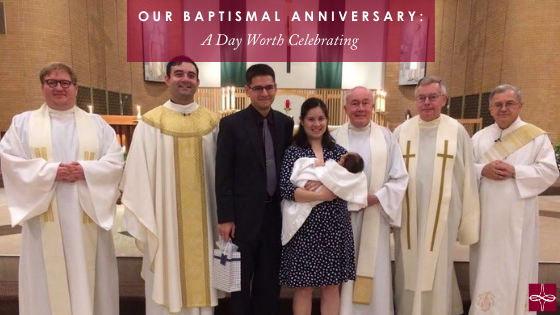

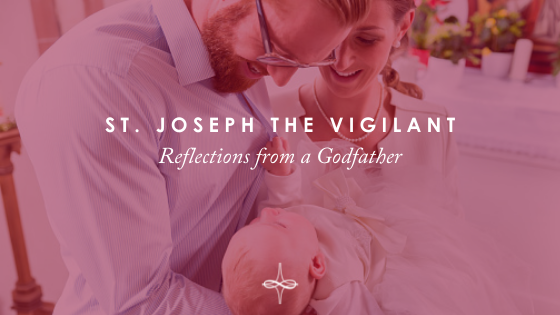
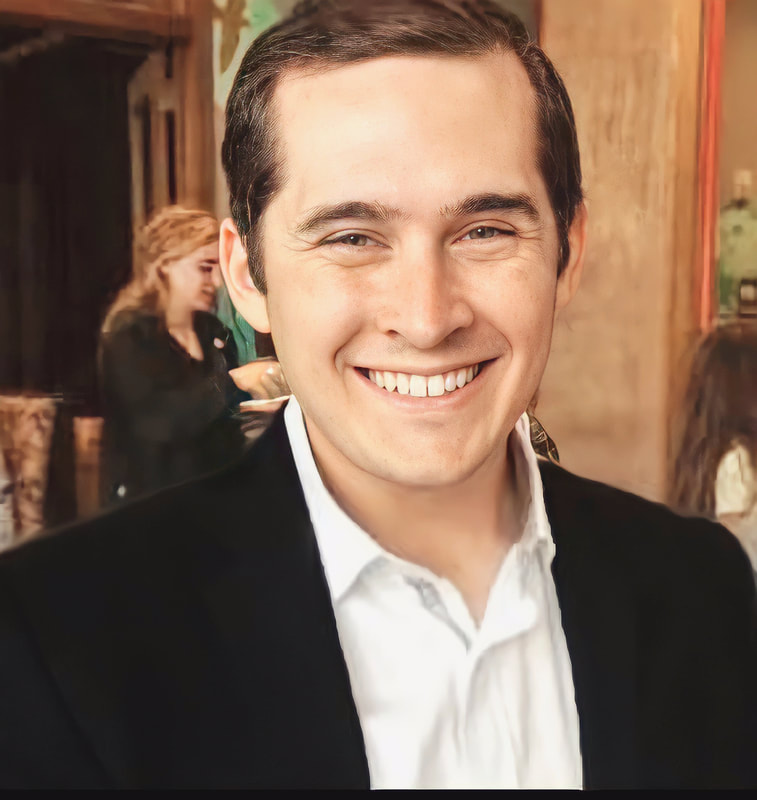
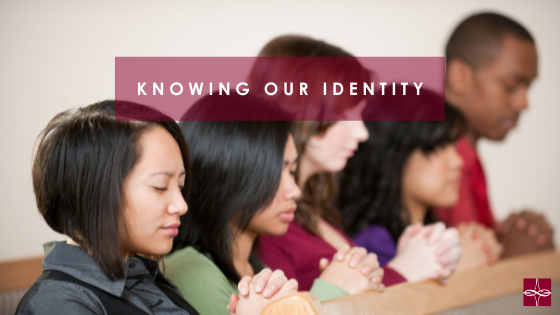

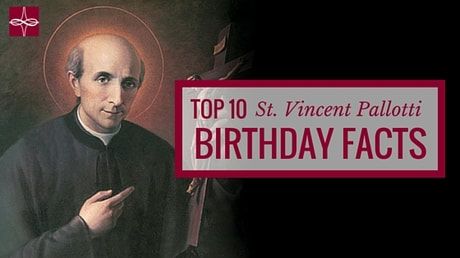
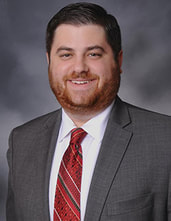
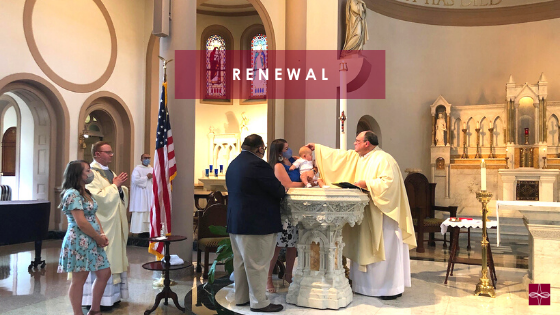


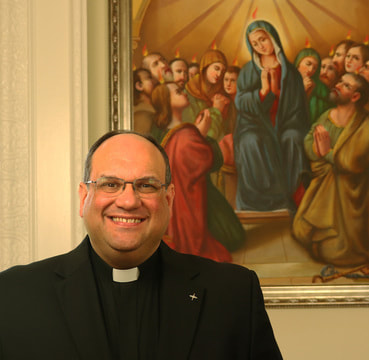


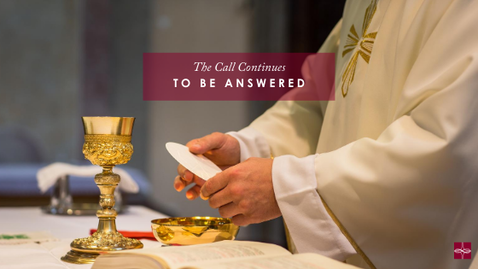

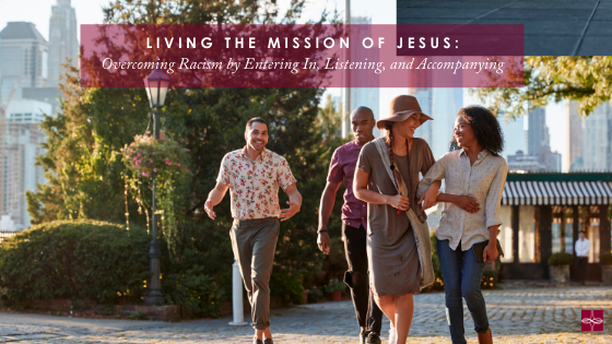

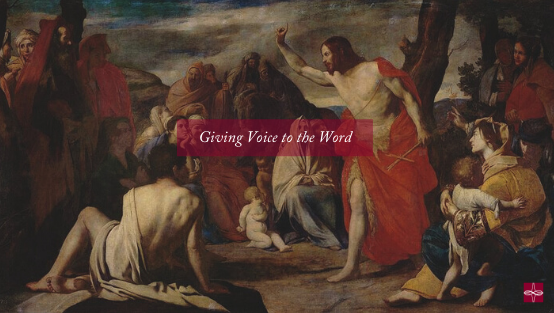

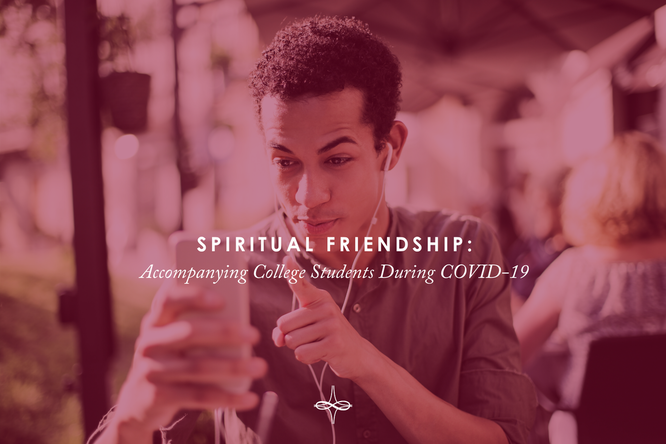
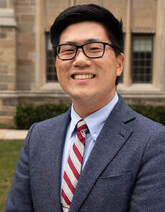
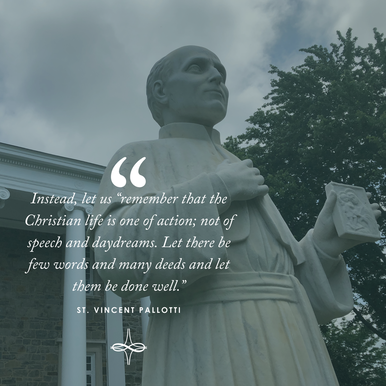
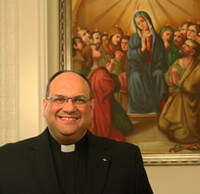
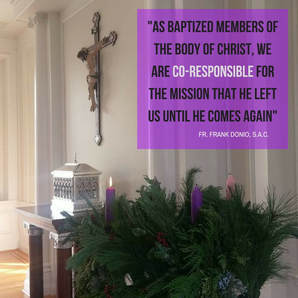
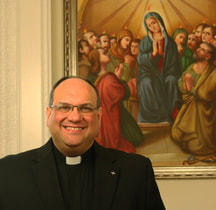
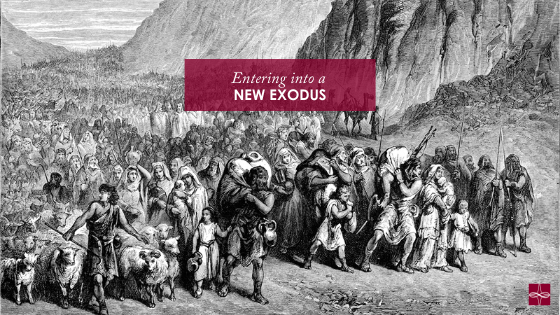
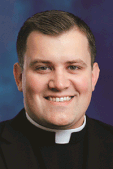
 RSS Feed
RSS Feed